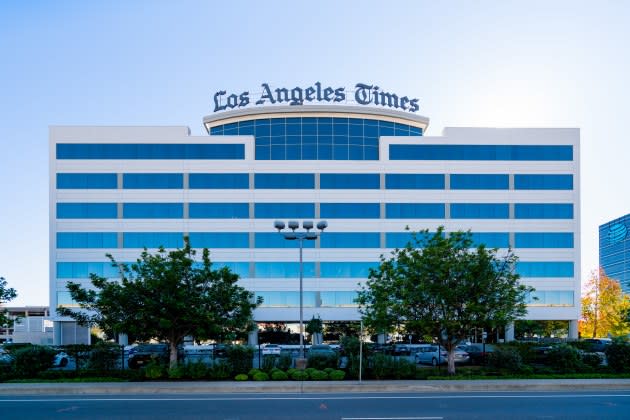Michael Cieply: What To Think About What’s Left Of The Los Angeles Times?
- Oops!Something went wrong.Please try again later.

The Los Angeles Times came weather-wrapped Thursday morning. There was more plastic than paper, or so it seemed. There wasn’t even enough paper, apparently, to run a proper obituary for Chuck Philips, the Pulitzer Prize-winning former Times reporter who died last month.
Details about Chuck’s passing have been sparse — he is said to have requested no postmortem attention. But the Times did manage to print a brief, paid death notice for three days running. Go figure.
More from Deadline
Justin Chang, Leading Film Critic, Leaves Los Angeles Times For The New Yorker
Michael Cieply: Dumb Snubs, Diversity Watch, Political Strife - A Practically Perfect Oscar Season
Chuck, as is well known in these parts, lost his job after succumbing to a hoax in his long quest to untangle the deadly rap music wars. He later said that a humiliating Page 1 apology and retraction in the Times was overblown and inaccurate. Be that as it may, he never lost the love and respect of colleagues, including myself, who found him a joy to know.
Dave Robb. Cari Beauchamp. Chuck Philips. Another good journalist gone.
But what are we to make of this shrinking Los Angeles Times, which is not quite gone but seems on the brink of following a generation of old-school editors and reporters to the grave? It is in the hands of an interim executive editor, the previous editor Kevin Merida having resigned, and is dealing with a 20% staff cut as the latest owner, Dr. Patrick Soon-Shiong, tries to figure out how to stop losing money.
I wish him luck, less for the sake of the Times as it is — a diminished, predictable amalgam of local interest, Hollywood gawkery and progressive narrative — than for what it has always wanted to be, a journalistic gold standard for the West Coast.
It never quite got there, though sometimes it was awfully close. In the 1980s, the paper was big, fat and self-important, heavily represented in Washington, D.C., and staffed at the top with writers who might unload a story once or twice a year. But when they delivered, they delivered with a vengeance. For sheer volume of prose, no one could beat the late Chandler-era Los Angeles Times. I think I actually wept the first time I saw 300 inches of soggy, raw copy, dumped on my wife for editing overnight — and that was just a routine feature for the View section. It wasn’t like that at the Wall Street Journal.
Then came editor Shelby Coffey, who aimed to make the paper clever, inside-y and sleek, like his own Style section at the Washington Post. He hired Nikki Finke. He hired me. He commissioned a redesign that was supposed to speed things up, but all those subheads and summaries just made you kind of dizzy, like a Carnaby Street fashion parade.
To make a long story short, things didn’t work out. Some of us, including Shelby, moved on. But the Times in the 1990s seemed to come into its own, thanks to a happy confluence of newcomers and veterans in the middle ranks, where the best daily journalism — on-the-ground reporting, common-sense editing — usually is born. Things were especially vibrant in the Business section, where a surprisingly cohesive bunch managed to combine the assertiveness of Hollywood trade reporting with the aggressiveness and scope of a big-time paper.
Believe me, that isn’t easy. There was a peak in 1999, when Philips and Michael Hiltzik shared their Pulitzer Prize for a series exposing corruption in the entertainment business. I came back to the paper a couple years late and had more fun than I ever thought could be had in a cramped, overstuffed newsroom, working as an editor-reporter with Philips, Jim Bates, Jeff Leeds, Eddie Sanders, Claudia Eller and a whole bunch of others. On the Hollywood front, our editorial policy was simple: We aimed to beat The New York Times at least once a day. And we did it often enough that the New York paper raided the Times staff, hiring four of us in the space of about two weeks.
Alas, it wasn’t hard to leave. Editors had squandered credibility with a failed campaign against the election of Arnold Schwarzenegger. Print economics were declining, online journalism didn’t seem to pay, and the new Tribune ownership was shaky. Tribune sold out to real estate mogul Sam Zell. Somewhere in the tangled mess was a bankruptcy. After Zell, in 2018, came biotech billionaire Soon-Shiong. Editors came and went. Diversity challenges rocked the newsroom. The paper moved from its landmark downtown headquarters, and it got smaller.
For what it’s worth, my wife and I still subscribe — not just online but to the print edition. I can’t say that I read it. But I like to keep track, just in case the Los Angeles Times wakes up again, does something interesting, runs proper obits for fascinating L.A. characters like the late, lamented, Pulitzer Prize-winning Chuck Philips.
Best of Deadline
'The White Lotus' Season 3: Everything We Know About The Cast, Premiere Date & More
Remembering Carl Weathers: His Career In Photos From 'Rocky' To 'Happy Gilmore' To 'The Mandalorian'
Sign up for Deadline's Newsletter. For the latest news, follow us on Facebook, Twitter, and Instagram.

